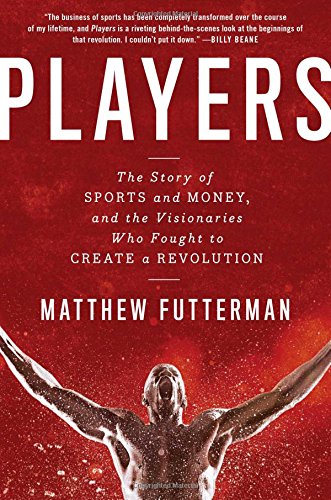
Players
The Story of Sports and Money, and the Visionaries Who Fought to Create a Revolution
فرمت کتاب
ebook
تاریخ انتشار
2016
نویسنده
Matthew Futtermanناشر
Simon & Schusterشابک
9781476716978
کتاب های مرتبط
- اطلاعات
- نقد و بررسی
- دیدگاه کاربران
نقد و بررسی

January 11, 2016
Futterman, a Pulitzer Prize–winning reporter and Wall Street Journal writer for sports, explains how sports evolved into big business in this smart, insightful, and pleasantly opinionated book. The road to corporate sponsorship and immense wealth was paved with good intentions (at least at first): Mark McCormack basically created the concept of the sports agent—launching Arnold Palmer as a brand, not a lackey for a corporation—and star tennis players withdrew from Wimbledon in 1973 so they could control their own schedules. As time progressed, the motivations behind this growing professionalism went from murky to purely materialistic; for example, Nike and Michael Jordan built the idea of the athlete as superhero, which shifted sports toward individuals, and teams began milking their fans’ passion (and their dollars) through cable networks. Clearly, the history of professional sports and the quest for cash is not over, but Futterman has provided an indispensable volume on what has happened so far.

February 1, 2016
Books on the financial aspects of sports usually focus on leagues, team owners, stadium deals, and media contracts. Sportswriter Futterman instead follows the rise of athletes as partners in the economic explosion of sports. He begins with Mark McCormack, a pioneer sports agent who demonstrated the reach of sports marketing in his ascent from representing golfer Arnold Palmer in the 1950s to leading the global marketing firm IMG five decades later. From this foundation, Futterman examines football, baseball, basketball, golf, tennis, and even Olympic events to recount how each sports' athletes broke free of the oppressive control once held by promoters, owners, and regulating committees to achieve their own financial autonomy. In the author's view, marketing's star-making machinations, with roots as deep as youth sports academies and travel teams, lead to too much emphasis on individual stars and too little on winning. He feels this misguided attention has altered how games are played to their detriment. The final chapter asserts that management's obsession with cable television deals has prompted a decrease in their popularity as spectator sports. His outlook is that money in sports is not necessarily bad, but its significance over the game is destructive to on-the-field competition. VERDICT This lively take on the money game in contemporary sports should be read widely.--John Maxymuk, Rutgers Univ. Lib., Camden, NJ
Copyright 2016 Library Journal, LLC Used with permission.

























دیدگاه کاربران